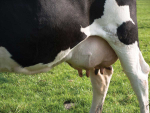OPINION: Contrary to recent suggestions in the media, there is very little credible research supporting the success of homeopathic treatment of mastitis in dairy cows.
In fact, reviews published recently covering research since 1970 concluded that ‘homeopathic treatments are not efficient for management of clinical mastitis’. A second review covering research since 1981 concluded that ‘the use of homeopathy currently cannot claim to have sufficient prognostic validity where efficacy is concerned’.
In plain English, if you want to cure your cow, use the antibiotics which have been the subject of rigorous research and been shown to reduce infection. And, of course, suffering.
Animal welfare is of increasing concern to consumers, and untreated mastitis is painful. Humans suffering from bugs reach for antibiotics to the extent of over-use, yet the regulations for organic milk mean that antibiotics are a last call and generally mean the cow suffers in the same way as without treatment (shown by no difference from the placebo treatments).
People supporting homeopathy have suggested that lack of response indicates that the treatments applied were not the right ones -- implying that homeopathic experts know better than the scientists doing the research. This may well be the case but the relatively new concept of ‘individualised homeopathy’ has been examined scientifically without finding any support for the assertions.
EU research published in Veterinary Record last year involved 180 lactating cows in a blind, randomised control study which included placebos. ‘The study results indicated that the effectiveness of individualised homeopathy does not go beyond a placebo effect and successful treatment is highly dependent on the specific mastitis pathogen’.
In the Journal of Dairy Science in 2017, another group of researchers examining production as well as cure concluded that their ‘blinded, randomised clinical trial for homeopathic mastitis treatments did not show differences in clinical cure rate, disease duration, milk yield, or SCC after clinical cure between placebo and homeopathic treatments, indicating that a specific treatment effect was not present for homeopathic remedies for mastitis’.
As well as animal welfare, other factors should be considered in organic milk production, such as the environmental impact.
The general belief is that organic methods are better for the environment than conventional systems, but this overlooks the yield implications. For well-run dairy operations, milk production from organic farms is generally 20-36% lower than from conventional farms.
This means that to produce the same amount of milk, more land is needed, potentially impacting on native land and biodiversity.
Of further concern is that greenhouse gas (GHG) production and nutrient loss are higher per unit of production from organic farms than conventional farms. For the same amount of milk produced, conventional farms are more efficient and have less environmental impact.
These differences are more pronounced in the northern hemisphere than in New Zealand, and reflect housing (organic cows generally have to have access to pasture for at least 120 days a year in the US and EU) as well as productivity.
Massey University’s research indicates that costs of production are higher for organic milk than for conventionally produced milk, particularly during drought (or flood or anything that detrimentally affects expected pasture growth) because of the difficulty in sourcing organic feed supplement.
Recognising the decreased production and increased cost, the payout for organic milk is generally higher than for conventional milk. Whether the premium offsets the opportunity cost depends on the season.
In the supermarket, the price for organic milk is 60% greater than standard milk (in a comparison of same brand and 2L bottles) but producers aren’t paid 60% more on farm. The extra cost in the supermarket reflects dedicated processing facilities and what the market can stand in the consumer desire for the product, whether that desire is or isn’t based on fact.
Producers and consumers have choices in New Zealand, and some agricultural leaders are trying to show what they think is a better way for production. The results from scientific research should not be sacrificed for ideology.
• Dr Jacqueline Rowarth CNZM CRSNZ HFNZIAHS











